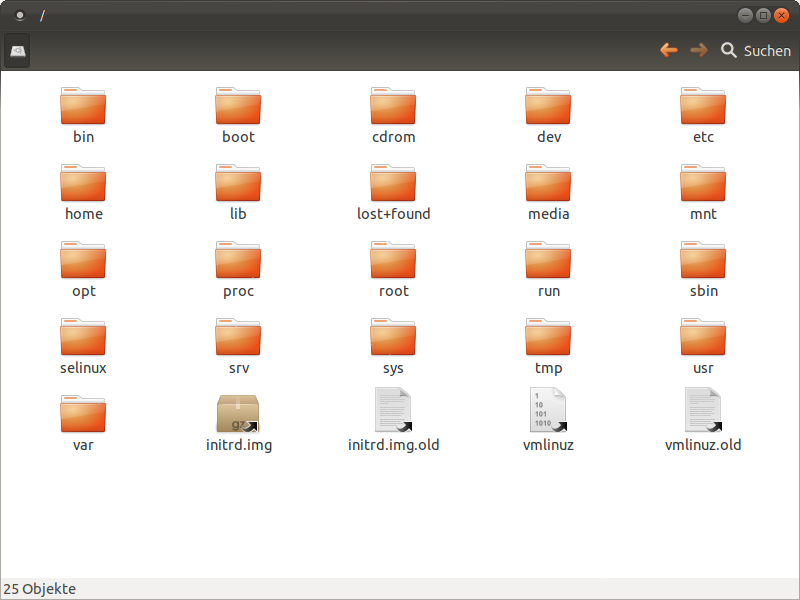The Filesystem Hierarchy Standard (FHS) defines the main directories and their contents in Linux operating systems. For the most part, it is a formalization and extension of the traditional BSD filesystem hierarchy.
Directory structure
In the FHS all files and directories appear under the root directory "/", even if they are stored on different physical devices. Note however that some of these directories may or may not be present on a Unix system depending on whether certain subsystems, such as the X Window System, are installed.
The majority of these directories exist in all UNIX operating systems and are generally used in much the same way; however, the descriptions here are those used specifically for the FHS, and are not considered authoritative for platforms other than Linux.
| Directory | Description |
|---|---|
| / | Primary hierarchy root and root directory of the entire file system hierarchy. |
| /bin/ | Essential command binaries that need to be available in single user mode; for all users, e.g., cat, ls, cp. |
| /boot/ | Boot loader files, e.g., kernels, initrd; often a separate partition |
| /dev/ | Essential devices, e.g., /dev/null. |
| /etc/ | Host-specific system-wide configuration files There has been controversy over the meaning of the name, but in early versions of the UNIX Implementation Document from Bell labs, the section for /etc is clearly commented as etcetra directory, as this directory historically held everything that did not belong elsewhere (though in FHS it is clearly restricted to static configuration files and may not contain binaries)Alternative meanings that have been suggested, such as "Editable Text Configuration" or "Extended Tool Chest" are almost certainlybackronyms that were introduced much later on |
| Configuration files for /opt/. |
| Configuration files for the X Window System, version 11. |
| Configuration files for SGML. |
| Configuration files for XML. |
| /home/ | Users' home directories, containing saved files, personal settings, etc.; normally a separate partition. |
| /lib/ | Libraries essential for the binaries in /bin/ and /sbin/. |
| /media/ | Mount points for removable media such as CD-ROMs (appeared in FHS-2.3). |
| /mnt/ | Temporarily mounted filesystems. |
| /opt/ | Optional application software packages |
| /proc/ | Virtual filesystem documenting kernel and process status as text files, e.g., uptime, network. In Linux, corresponds to a Procfs mount. |
| /root/ | Home directory for the root user. |
| /sbin/ | Essential system binaries, e.g., init, ip, mount. |
| /srv/ | Site-specific data which is served by the system. |
| /tmp/ | Temporary files (see also /var/tmp). Often not preserved between system reboots. |
| /usr/ | Secondary hierarchy for read-only user data; contains the majority of (multi-)user utilities and applications. |
| Non-essential command binaries (not needed in single user mode); for all users. |
| Standard include files. |
| Libraries for the binaries in /usr/bin/ and /usr/sbin/. |
| Non-essential system binaries, e.g., daemons for various network-services. |
| Architecture-independent (shared) data. |
| Source code, e.g., the kernel source code with its header files. |
| X Window System, Version 11, Release 6. |
| Tertiary hierarchy for local data, specific to this host. Typically has further subdirectories, e.g., bin/, lib/, share/. |
| /var/ | Variable files—files whose content is expected to continually change during normal operation of the system—such as logs, spool files, and temporary e-mail files. Sometimes a separate partition. |
| Application cache data. Such data is locally generated as a result of time-consuming I/O or calculation. The application must be able to regenerate or restore the data. The cached files can be deleted without data loss |
| State information. Persistent data modified by programs as they run, e.g., databases, packaging system metadata, etc. |
| Lock files. Files keeping track of resources currently in use. |
| Log files. Various logs. |
| Users' mailboxes. |
| Information about the running system since last boot, e.g., currently logged-in users and running daemons. |
| Spool for tasks waiting to be processed, e.g., print queues and unread mail. |
| Deprecated location for users' mailboxes. |
| Temporary files to be preserved between reboots. |


 10:58 AM
10:58 AM
 fog flames
fog flames













0 comments:
Post a Comment